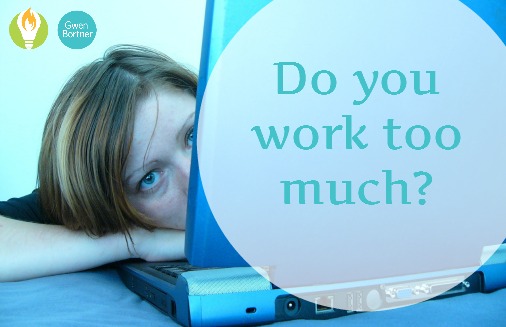The title of this post seems like a simple enough question, but in reality it rarely is. Whether you are an employee or self-employed it is easy to find the lines between work and personal life blurred.
There are host of sayings that point to this issue. This can be particularly true when you do work that you truly love. You find yourself just “tinkering” or working on something that will be “real quick” and suddenly hours have passed. Then, as weeks and months turn into years you realize that your outside interests are limited, if non-existent. If this sounds like you, trust me: you are not alone.
The Problem: No Room for Creativity
When you first start working too much, it is easy to justify it for all sorts of reasons:
- I’m just doing it to get through an immediate, pressing deadline.
- Start-ups always take a huge investment in time until they are established.
- I really enjoy what I do, so it doesn’t really feel like work.
These are just a few examples, but they give you the idea.
The problem is that when all your time is spent focusing on your work, your world quickly becomes surprisingly narrow. This may not seem like an issue at first, since focus is generally thought to be a good thing. The issue is that new and creative thoughts rarely come from a world in which you are already intimately involved.
When you work too much, problem solving is actually much more difficult than when you have large chunks of time to spend on non-work activities. Notice that the key word here is LARGE. An hour here or there will help, but is rarely sufficient to open our minds to new thoughts and ideas. In order to really get inspired by something new, we first have to let go of what we are already processing and that can take time.
When you work at home, the problem can be even more prominent. Unless you are very rigid about only using your office space for work and only doing work in your office space it is easy to find yourself working all but a few hours between waking and sleeping.
The Test: I’m Not Really That Way… Am I?
Some of us can quickly identify that we are working too much. The bigger issue is that usually means we have been engaged in that behavior much longer and in a bigger way than we realize.
If any of these statements ring true for you, you are probably already working too much (even if you don’t think so):
- You regularly work late or on the weekend.
- When you take a day off, you aren’t quite sure what to do other than possibly veg-out.
- You can’t remember the last time you engaged in your hobby for more than an hour or two.
- You don’t actually have a hobby that isn’t connected in some way with your job.
- Taking a vacation freaks you out because of how much you have to do before you leave and after you come back.
- The vast majority (if not all) of the people you spend time with are somehow connected with your work.
If you could identify with even one of the above statements, try tracking your time for a few weeks – and be honest. Even that “quick thing” you do at home so you won’t have to worry about it tomorrow counts. If commuting to work is 30 minutes or more, track that time as well, but separately. It is different than work time (unless you are working on public transportation), but is still related to your total hours.
After tracking a few weeks, most folks are surprised by how many hours they actually put into work. If asked prior to tracking, most estimate 10% – 25% less than they actually spend. And often, the extra time isn’t actually getting more accomplished.
The Solution: Commit to Something Different
Working too much is ultimately a habit, just like so many other things in our lives. As such, the only real solution is to make a commitment to change the habit. Changing habits is never easy, but is possible. I wrote about “breaking the cycle” several years ago. The information there applies here as well.
One of the key elements in changing a habit is to figure out what you will do in place of the thing you’re trying to remove or chnage. This may seem easy when it comes to working less, but in reality it’s not so. Most people who work too much actually enjoy what they do and/or find it very interesting, so the replacement activity has to be at least, if not more, compelling. Watching TV or hanging out on social media probably won’t suffice.
In most cases the best answer is a hobby, either creative or physical. If you have a hobby you have let wane, make sure it still interests you and if so, make a commitment to become more fully engaged. If your existing hobby doesn’t spark interest or you don’t have a hobby, find one.
I make that sound simple, even though I know it is not. But it is possible. Think about activities you enjoyed much earlier in life; often you can find inspiration in your past. Make a commitment to try and explore new things, even if for a period of time the process of exploring hobbies acts as your hobby!
The ultimate benefit is two-fold. Hobbies, creative or physical, are a great way to expand our world both in terms of the people we know and the knowledge and experience we posses. In addition, by actively engaging in something other than work, our mind will be more creative, agile and productive when we are at work.
What is a hobby you currently engage in or are interested in trying?


